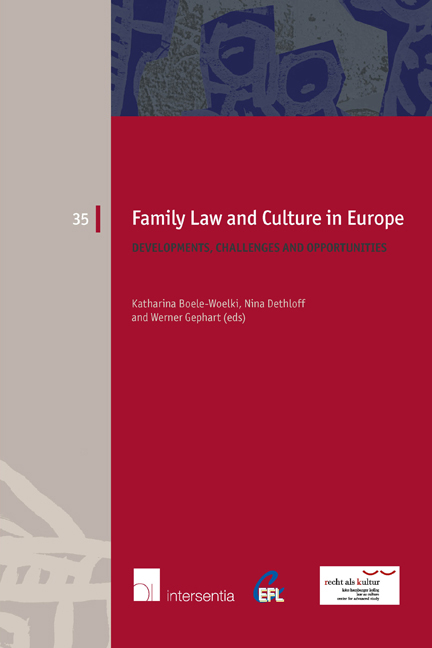Book contents
- Frontmatter
- Preface
- Contents
- List of Authors
- PART ONE THE CEFL PRINCIPLES ON PROPERTY RELATIONS BETWEEN SPOUSES
- PART TWO BREAKUP OF (NON-)FORMALISED RELATIONSHIPS
- Statutory Regulation of Cohabiting Relationships in the Nordic Countries: Recent Developments and Future Challenges
- Legislating for Cohabitation in Common Law Jurisdictions in Europe: Two Steps Forward and One Step Back?
- The Swedish Cohabitees Act in Today's Society
- Maintenance between Former Spouses and Gender Equality
- Collaborative Practice: An Interdisciplinary Approach to the Resolution of Confl ict in Family Law Matters
- PART THREE NEW CONCEPTS OF PARENTAGE
- PART FOUR INTERNATIONAL FAMILY RELATIONSHIPS
- PART FIVE TRANSNATIONAL FAMILIES: ACROSS NATIONS AND CULTURES
- EUROPEAN FAMILY LAW SERIES
Maintenance between Former Spouses and Gender Equality
from PART TWO - BREAKUP OF (NON-)FORMALISED RELATIONSHIPS
Published online by Cambridge University Press: 22 November 2017
- Frontmatter
- Preface
- Contents
- List of Authors
- PART ONE THE CEFL PRINCIPLES ON PROPERTY RELATIONS BETWEEN SPOUSES
- PART TWO BREAKUP OF (NON-)FORMALISED RELATIONSHIPS
- Statutory Regulation of Cohabiting Relationships in the Nordic Countries: Recent Developments and Future Challenges
- Legislating for Cohabitation in Common Law Jurisdictions in Europe: Two Steps Forward and One Step Back?
- The Swedish Cohabitees Act in Today's Society
- Maintenance between Former Spouses and Gender Equality
- Collaborative Practice: An Interdisciplinary Approach to the Resolution of Confl ict in Family Law Matters
- PART THREE NEW CONCEPTS OF PARENTAGE
- PART FOUR INTERNATIONAL FAMILY RELATIONSHIPS
- PART FIVE TRANSNATIONAL FAMILIES: ACROSS NATIONS AND CULTURES
- EUROPEAN FAMILY LAW SERIES
Summary
INTRODUCTION
Maintenance as a claim between former spouses has a connection to many gender aspects, above all in opposite-sex marriages. These gender aspects have not yet been well researched in many European countries, and as a result we can see, for example, that amendment bills contain prejudiced argumentation or argumentation with general clichés.
In my research, based especially on German and Czech law, I seek to show that the background of many maintenance regulations is incompatible with gender equality.
I understand gender equality as a real type of equality that goes beyond formal equality de jure. A regulation is only equal when it does not reproduce traditional gender roles but respects the real differences between the sexes in society to avoid indirect discrimination. I will also draft some principles that would make maintenance more equitable.
NECESSITY TO JUSTIFY MAINTENANCE
Divorce should end every legal bond between spouses. According to German law, there is a basic principle that every person should be responsible for him/ herself after divorce; it means that he or she should provide for his or her own support. In Czech law, there is no explicit basic principle of maintenance between former spouses in the law, but the interpretation of the law generally recognises the duty of the divorced spouse to provide for his own support, too. Even in the CEFL Principles there is a basic principle of self-sufficiency. It means that maintenance claims are an exception to this basic rule. Therefore a justification for this exception appears to be necessary.
However, there are also other reasons for the justification of maintenance claims. The social acceptance of maintenance between former spouses in the Czech Republic and in Germany is low. A well-researched and structured justification supports the parties – the decision of one of the spouses to ask for maintenance and the other spouse to accept the claim and provide maintenance. The justification of the maintenance claim also explains the sense and purpose of the law, which is important for its interpretation and application.
Finally, a well-structured and researched justification for maintenance between former spouses appears to be necessary because of the gender dimension of maintenance between former spouses.
- Type
- Chapter
- Information
- Family Law and Culture in EuropeDevelopments, Challenges and Opportunities, pp. 109 - 118Publisher: IntersentiaPrint publication year: 2014

